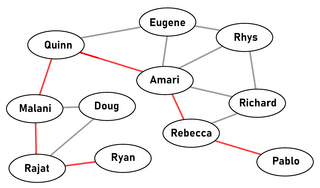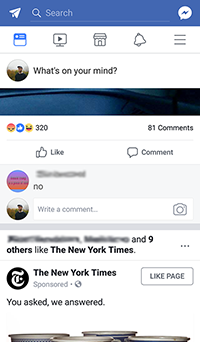Related Research Articles

Albert-László Barabási is a Romanian-born Hungarian-American physicist, best known for his discoveries in network science and network medicine.
Michael S. Gazzaniga is an American psychologist who is a professor of psychology at the University of California, Santa Barbara, where he heads the new SAGE Center for the Study of the Mind. He is one of the leading researchers in cognitive neuroscience, the study of the neural basis of mind. He is a member of the American Academy of Arts & Sciences, the Institute of Medicine, and the National Academy of Sciences.
A cost overrun, also known as a cost increase or budget overrun, involves unexpected incurred costs. When these costs are in excess of budgeted amounts due to a value engineering underestimation of the actual cost during budgeting, they are known by these terms.

A user profile is a collection of settings and information associated with a user. It contains critical information that is used to identify an individual, such as their name, age, portrait photograph and individual characteristics such as knowledge or expertise. User profiles are most commonly present on social media websites such as Facebook, Instagram, and LinkedIn; and serve as voluntary digital identity of an individual, highlighting their key features and traits. In personal computing and operating systems, user profiles serve to categorise files, settings, and documents by individual user environments, known as ‘accounts’, allowing the operating system to be more friendly and catered to the user. Physical user profiles serve as identity documents such as passports, driving licenses and legal documents that are used to identify an individual under the legal system.

Yuval Noah Harari is an Israeli medievalist, military historian, public intellectual, and writer. He currently serves as professor in the Department of History at the Hebrew University of Jerusalem. He is the author of the popular science bestsellers Sapiens: A Brief History of Humankind (2011), Homo Deus: A Brief History of Tomorrow (2016), 21 Lessons for the 21st Century (2018), and Nexus (2024). His published work examines themes of free will, consciousness, intelligence, happiness, and suffering.

Six degrees of separation is the idea that all people are six or fewer social connections away from each other. As a result, a chain of "friend of a friend" statements can be made to connect any two people in a maximum of six steps. It is also known as the six handshakes rule. Mathematically it means that a person shaking hands with 30 people, and then those 30 shaking hands with 30 other people, would after repeating this 6 times allow every person in a population as large as the United States to have shaken hands.

Sapiens: A Brief History of Humankind is a book by Yuval Noah Harari, first published in Hebrew in Israel in 2011 based on a series of lectures Harari taught at The Hebrew University of Jerusalem, and in English in 2014. The book, focusing on Homo sapiens, surveys the history of humankind, starting from the Stone Age and going up to the twenty-first century. The account is situated within a framework that intersects the natural sciences with the social sciences.

Social media analytics or social media monitoring is the process of gathering and analyzing data from social networks such as Facebook, Instagram, LinkedIn, or Twitter. A part of social media analytics is called social media monitoring or social listening. It is commonly used by marketers to track online conversations about products and companies. One author defined it as "the art and science of extracting valuable hidden insights from vast amounts of semi-structured and unstructured social media data to enable informed and insightful decision-making."

Homo Deus: A Brief History of Tomorrow is a book written by Israeli author Yuval Noah Harari, professor at the Hebrew University in Jerusalem. The book was first published in Hebrew in 2015 by Dvir publishing; the English-language version was published in September 2016 in the United Kingdom and in February 2017 in the United States.

Cambridge Analytica Ltd. (CA), previously known as SCL USA, was a British political consulting firm that came to prominence through the Facebook–Cambridge Analytica data scandal. It was started in 2013, as a subsidiary of the private intelligence company and self-described "global election management agency" SCL Group by long-time SCL executives Nigel Oakes, Alexander Nix and Alexander Oakes, with Nix as CEO. The well-connected founders had contact with, among others, the British Conservative Party, royal family, and military. The firm maintained offices in London, New York City, and Washington, D.C. The company closed operations in 2018 in the course of the Facebook–Cambridge Analytica data scandal, although firms related to both Cambridge Analytica and its parent firm SCL still exist.

Facebook's Feed, formerly known as the News Feed, is a web feed feature for the social network. The feed is the primary system through which users are exposed to content posted on the network. Feed highlights information that includes profile changes, upcoming events, and birthdays, among other updates. Using a proprietary method, Facebook selects a handful of updates to show users every time they visit their feed, out of an average of 2,000 updates they can potentially receive. Over two billion people use Facebook every month, making the network's Feed the most viewed and most influential aspect of the news industry. The feature, introduced in 2006, was renamed "Feed" in 2022.

Christopher Wylie is a British-Canadian data consultant. He is noted as the whistleblower who released a cache of documents to The Guardian he obtained while he worked at Cambridge Analytica. This prompted the Facebook–Cambridge Analytica data scandal, which triggered multiple government investigations and raised wider concerns about privacy, the unchecked power of Big Tech, and Western democracy's vulnerability to disinformation. Wylie was included in Time magazine's 100 Most Influential People of 2018. He appeared in the 2019 documentary The Great Hack. He is the head of insight and emerging technologies at H&M.

Vero is a social media platform and mobile app company. Vero markets itself as a social network free from advertisements, data mining and algorithms.
In the 2010s, personal data belonging to millions of Facebook users was collected without their consent by British consulting firm Cambridge Analytica, predominantly to be used for political advertising.

21 Lessons for the 21st Century is a book written by Israeli author Yuval Noah Harari and published in August 2018 by Spiegel & Grau in the US and by Jonathan Cape in the UK. It is dedicated to the author's husband, Itzik.
Social media use in politics refers to the use of online social media platforms in political processes and activities. Political processes and activities include all activities that pertain to the governance of a country or area. This includes political organization, global politics, political corruption, political parties, and political values. The media's primary duty is to present us with information and alert us when events occur. This information may affect what we think and the actions we take. The media can also place pressure on the government to act by signaling a need for intervention or showing that citizens want change
VITAL was a Board Management Software machine learning proprietary software developed by Aging Analytics, a company registered in Bristol (England) and dissolved in 2017. Andrew Garazha declared that the project aimed "through iterative releases and updates to create a piece of software capable of making autonomous investment decisions." According to Nick Dyer-Witheford, VITAL 1.0 was a "basic algorithm".
Dashun Wang co-founded the Ryan Institute on Complexity. Wang is a recipient of the AFOSR Young Investigator award (2016) and was named one of Poets & Quants Best 40 Under 40 Professors (2019).

The WEIRDest People in the World: How the West Became Psychologically Peculiar and Particularly Prosperous is a 2020 book by Harvard professor Joseph Henrich that aims to explain history and psychological variation using approaches from cultural evolution and evolutionary psychology. In the book, Henrich explores how institutions and psychology jointly influence each other over time. More specifically, he argues that a series of Catholic Church edicts on marriage that began in the 4th century undermined the foundations of kin-based society and created the more analytical, individualistic thinking prevalent in western societies.

Michal Kosinski is an associate professor of Organizational Behavior at Stanford University, a computational psychologist, and a psychometrician. He studies the psychological processes in Large Language Models (LLMs), as well as AI and big data to model and predict human behavior.
References
- 1 2 3 Brooks, David (2013-02-04). "Opinion | The Philosophy of Data". The New York Times. ISSN 0362-4331 . Retrieved 2018-01-05.
- 1 2 Harari, Yuval Noah (2017). Homo Deus: A Brief History of Tomorrow. UK: Vintage Penguin Random House. p. 428. ISBN 9781784703936.
- 1 2 Barabási, Albert-László (September 23, 2022). "Why the World Needs 'Dataism,' the New Art Movement That Helps Us Understand How Our World Is Shaped by Big Data". news.artnet.com/. Archived from the original on January 1, 2024. Retrieved January 1, 2024.
{{cite web}}: CS1 maint: bot: original URL status unknown (link) - ↑ Igo, Sarah E. (2015-03-20). "You can run from Big Data, but can you hide?". Washington Post. ISSN 0190-8286 . Retrieved 2018-01-05.
- ↑ Lohr, Steve (May 2015). Data-ism : The Revolution Transforming Decision Making, Consumer Behavior, and Almost Everything Else (First ed.). New York, NY: HarperBusiness. ISBN 978-0062226815. OCLC 861210012.
- ↑ Harari, Yuval. "'Homo sapiens is an obsolete algorithm': Yuval Noah Harari on how data could eat the world" . Retrieved 2018-01-05.
- ↑ Harari, Yuval Noah (2017). Homo Deus: A Brief History of Tomorrow. UK: Vintage Penguin Random House. p. 445. ISBN 9781784703936.
- ↑ Harari, Yuval Noah (2016-08-26). "Yuval Noah Harari on big data, Google and the end of free will". Financial Times. Retrieved 2018-01-05.
- ↑ Yuval Noah Harari (18 April 2013). "Data Processing - Part 1" (Video). YouTube . Retrieved 27 September 2018.
- ↑ "Some Thoughts on Dataism". Daniel Miessler. 2017-04-07. Retrieved 2018-01-05.
- ↑ "From Humanism to Dataism. A future scenario. - Dataethical Thinkdotank". Dataethical Thinkdotank. 2017-04-25. Retrieved 2018-01-05.
- ↑ Steven Parton (30 September 2018). "The Rise of Dataism: A Threat to Freedom or a Scientific Revolution?". Singularityhub.com. Retrieved 18 November 2019.
- ↑ Terry Ortlieb (2017-03-07), is Harari Dataism Dystopian , retrieved 2018-01-05
- ↑ Hannes Grassegger; Mikael Krogerus (28 January 2017). "The Data That Turned the World Upside Down". Vice.com. Retrieved 18 November 2019.